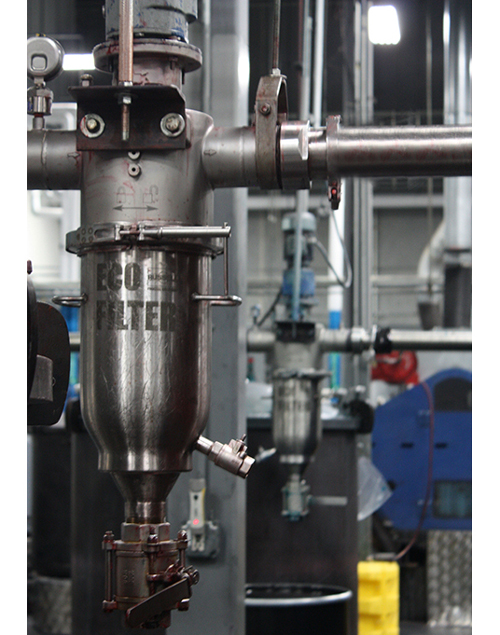Inx International Discovers Wealth Of Benefits From New Filtration System
As a recognized leader in decorative printing inks for beverage cans, Inx International relies on self-cleaning filters to achieve significant productivity gains and to reduce machine downtime

Established in 1992, INX International is the American subsidiary of Sakata INX Corporation, a Japanese company that has been producing inks since 1896. As the world’s largest producer of metal decorating inks, the custom-blended ink is primarily used to print on the exterior of aluminium beverage and beer cans.
After a series of problems during the production of their liquid ink mix, Inx International identified that contamination from the manufacturing process was entering the process stream. With the imminent risk of the metallic contamination damaging expensive machinery, Inx international recognized that installing a filtration system could play a vital role in protecting equipment.
“Being proactive about filtration minimizes downtime on all our other production equipment downstream,” explains Bill Black, Plant Engineer at Inx International.
Because the ink is made in batches, Inx were also seeking a filtration solution that would reduce waste and enable them to operate leaner through improved productivity. The new unit needed to be operator friendly, so it could be easily dismantled and cleaned during color changes with minimal disruption to production.
In an effort to resolve these problems, Inx International chose a Self-Cleaning Russell Eco Filter® from Russell Finex of Pineville, North Carolina. Russell Finex has a long history of addressing and solving challenges that occur in the ink and coatings industry, as well as extensive experience of working with customers to determine the appropriate use of liquid filtration equipment.
The plant employs a fleet of six Russell Eco filters, which play a major part in ensuring product quality as well as avoiding machinery failures further down the process line. “The liquid ink mix is fed through a filter with a 200 micron screen, to remove the metallic particles and other foreign contamination” explains Black.
The 46,000-square-foot Charlotte facility, which opened in 2004, specializes in formulating ink for metal decorating, that is an exact color match to customer requirements. The ink is manufactured 24 hours a day, 7 days a week. “Every pound of ink produced goes through the Russell Eco Filters”, comments Black.
Once packaged, the ink which sells under the trademark of INX International brand, is shipped throughout the US and worldwide to the major aluminium can makers, such as Metal Container Corp. (part of Anheuser-Busch), Ball Corp.’s Metal Beverage Packaging Division, Rexam Beverage Can, and Crown Cork & Seal Co. (who make beverage cans for Coca-Cola, Pepsi, Budweiser and Monster energy drink, as well as others). To put that in perspective, the plant produces the ink that coats approximately 65% of the cans used around the world and 100% of the cans in the U.S.
Manufactured at the Russell Finex plant, the Eco filter is a self-cleaning unit that integrates directly into an existing pipeline and is a sought-after alternative to messy bag and cartridge filters. By means of a unique spiral wiper design, the filter element is kept continuously clean, which ensures optimum filtration efficiency. The Russell filter completely eliminates the labor intensive and frequent stops.
Because the self-cleaning filters run around the clock, Black appreciates the filter’s ease of operation and the ability for operators to quickly dismantle the units for cleaning between batch runs.
“The machine is very simple to operate. It comes apart and puts together easy with no bolts or tools needed,” says Black. “The operators take out the filter element and clean the inside of the unit. On start-up, they just open the purge valve to flush out any contamination.”
The Eco Filter is available in a range of sizes to suit different flow rates. Inx chose a short body filter design to keep the filtration surface area to a minimum, helping to reduce the time it takes to clean the unit during color changeovers.
“Our material is solvent based and very viscous, I mean really dense”, explains Black. “We measure our ink in poise, not centipoise, yet everything on the Russell filter holds up really well, from the motor to the gearbox”, adds Black. “On a maintenance level, there’s really not a lot of preventative maintenance involved with the filter. It’s really a good, solid system”.
As Inx continues to compete in the decorative printing ink industry, the benefits of installing the filter system have surprised Black. “Overall, I think the filters work great. I appreciate the good local support and quick delivery of parts.” Black concludes, “We’re planning to expand the Charlotte plant sometime in the future, so I anticipate we’ll be adding another Russell filter to ensure ink purity and improve operation efficiency.”
For almost 80 years Russell Finex has been manufacturing and supplying sieves and filters to ensure that powders and liquids are free from contamination, improve product quality, enhance productivity and safeguard the health of workers. Throughout the world, Russell Finex serves a variety of industries with applications including paint, coatings, chemicals, adhesives, plastisols, food, pharmaceuticals, metal powders and ceramics.
CONTACT
Martin Chipperfield
Russell Finex Ltd
martin.chipperfield@russellfinex.com
www.russellfinex.com
+44 (0) 20 8818 2000
Friday 22 August 2014 / file under Engineering | Machinery



